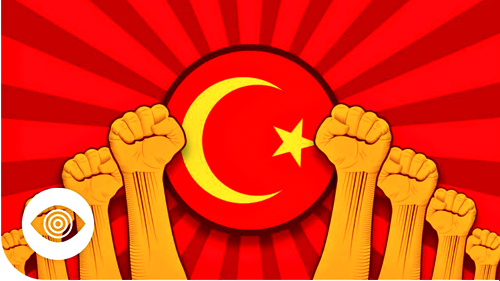The Indian communist
- By : Anirban Ganguly
- Category : Articles

On a just concluded trip to Vietnam, I found myself repeatedly asking this question: what is it that makes Indian communists so disdainful of their motherland? Why is it that such a breed of mother-hating communists – cadres and leaders – are unique to India. The Indian communist and their ideological comrades of all hues feel are almost always found on the side of those who call for the breaking up of the motherland and who unequivocally fuel fissiparous tendencies. Their heart bleeds for terrorists and separatists; their loudest support is always and unfailingly extended to those whose ideological aim is to overthrow the very idea of India. Patriotism, for the Indian communists is verboten and love of motherland, pride in the motherland are emotions that are reactionary in nature and need to be deconstructed and rejected. Read This – Beyond politicisation of rape In contrast, one is struck with the dogged attachment with their mother-soil, their “fatherland”, that communists in Vietnam demonstrate. For them, patriotism is a faith and a palpable emotion that has held them together and that continues to drive them towards a continuous process of national transformation. Ho Chi Minh’s unique capacity of blending Marxism with Confucianism and Nationalism is something that set him apart and which enabled his people to strike deeper roots in their civilisational identity and wisdom, while also working to evolve themselves into a modern nation state. Read This – Visions of a modern minister It was interesting to listen to one of the Central Committee Members and their Vice President, of Vietnam’s attempt to retain and reinvigorate its cultural identity and while also trying to integrate itself in the wider world. The recognition that they have always accorded to their civilisational anchors has enabled the Vietnamese people to retain their civilisational rootedness. They have not given up on their past, their politics, while directed by communism has succeeded in retaining that distinct indigenous flavour, they have not given up on their civilisational philosophies, nor have they diluted their attachment to the soil from which they have sprung. Their attachment to the unit of the family, their concept of a larger solidarity group is among their sustaining civilisational pillars. It is essentially this rootedness that saw them emerge victorious against the American onslaught. Their positions and theories did not solely evolve out of smoky politbureau debate rooms but were honed in and infused with conviction from stolid experiences gained in the field among the people. These were then upheld and corroborated by the strength of an ancient wisdom which was typical to Eastern civilisations. Their realism, pragmatism and willingness to avoid stagnation stemmed from that attachment. This is, unlike India communists who have continuously spewed venom against the entire array of Bharatiya civilisational knowledge. Such a unique blend has made the Vietnamese capable of adapting to evolving times, to re-evaluate and re-structure their positions both ideological and political, and to be remarkably open to the wider world. I was intrigued to see their interest in Prime Minister Modi, in his policies, in his governance model and in the changes he is ushering in. It is their inherent and continuing tie to their civilisational wisdom that has made them keen observers of global currents. Prime Minister Modi’s emphasis on transparency and accountability is what attracts their attention; they find an echo of it in their own workings. His foreign policy vision, succinctly articulated in the “Panchamrit” concept defined by “Samman”, “Samvad”, “Samriddhi”, “Suraksha” and “Sanskriti evam Sabhyata” attracts them. One found an enthusiastic response and eager attention when one described how Prime Minister Modi has encouraged his government’s foreign policy to be inspired by India’s “civilisational ethos.” Earlier this year he had spelt it out when he said, “Our strategic intent is shaped by our civilisational ethos of realism, co-existence, cooperation, and partnership, these are the four stilts upholding Prime Minister’s foreign policy doctrine and it is these articulations – inspired and steeped in our traditional wisdom – that interests them, because they themselves seem to aspire to move ahead without dissolving their essential identity. Hemmed in by a hegemon, multiple times their size; they wish to hold their ground, charter their forward march, decide on their own their priorities and then define the way ahead. In this, it is their sense, that they can pick much from India. The Indian communists, on the other hand, have resoundingly failed to hold their ground and to spread. Their rejection of Bharat, their refusal to acknowledge her civilisational dimension, their limited knowledge of that dimension and their intellectual dishonesty in interpreting it have gradually reduced them to a rump. Their inability to adapt and evolve, their over-reliance on false propaganda, their fixation with the promotion of the theory of “many nationalities” in India, is proving to be their undoing. But it is perhaps their rejection of patriotism in the Indian context that continues to shrink Indian communists while making them suspect in the eyes of the majority. One of Ho Chi Minh’s finest articulations on patriotism was when he said, “Our people are inspired by ardent patriotism. This is an invaluable tradition of ours. At all time, whenever the Fatherland is invaded, this patriotism forms an immensely powerful wave sweeping away all dangers and drowning all traitors and aggressors.” Indian communists, however, have always denigrated “ardent patriotism”, have negated its “invaluable” “tradition” and have always sided with the “traitors” and the “aggressors.”

















